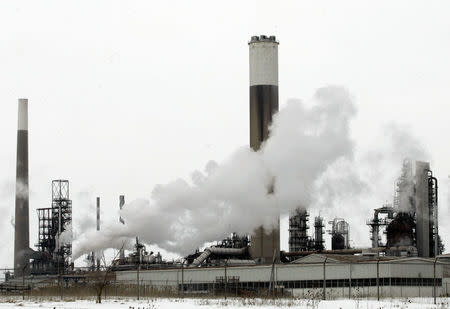Canada's Imperial Oil resumes shipping crude by rail

By Nia Williams CALGARY, Alberta (Reuters) - Canadian crude producer Imperial Oil has recently resumed shipping crude oil by rail from its terminal in Edmonton, Alberta, because of a marginal improvement in rail economics, a company spokesman said on Tuesday. The pickup in volumes is good news for the Alberta government, which is relying on rail to help draw down crude storage inventories in Canada's main oil-producing province. "We have started a small amount of shipments that are economic under current conditions," Imperial spokesman Jon Harding said in an email, declining to give exact volumes. Calgary-based Imperial slashed rail shipments from nearly 170,000 barrels per day in December to near zero in February after the government imposed mandatory production cuts on oil companies. Alberta curtailed production to help narrow the discount on Canadian crude, which last year widened to record levels because of congestion on export pipelines. However, the differential between Canadian heavy barrels and U.S. crude tightened so sharply, rail shipments were no longer economical, Imperial Chief Executive Rich Kruger said on an earnings call last month. Canadian crude traders say a discount of around $15 a barrel on Canadian heavy oil versus U.S. crude is generally needed to make rail economical, although that can be narrower depending on prices in the market the crude is destined for, and what transportation deals shippers have in place. Benchmark Canadian heavy crude was last trading around $10 per barrel below U.S. crude, having tightened to just over $8 a barrel in January. Canadian crude by rail volumes hit a record high of 354,000 bpd in December, according to the National Energy Board, before declining. Analysts at TPH Energy Research estimate March volumes so far are in the 160,000-175,000 bpd range but said activity is picking up. "Public data for weekly carloads from the two major Canadian rail operators points to the latest week's data being the highest level (a whopping 10,600 carloads for the week) since late January when the wheels started to fall off and rail volumes fell precipitously," they wrote in a note. The Alberta government is planning to start moving 120,000 bpd of crude by rail later this year. Imperial has been critical of curtailments and this month delayed an oil sands project citing uncertainty caused by government intervention, but was positive about boosting crude by rail volumes. "We support efforts to expand rail shipments in order to reach higher-value markets and to help alleviate industry pipeline constraints, to the benefit of Albertans," Harding said. (Reporting by Nia Williams in Calgary; Editing by Tom Brown and Matthew Lewis)

 Yahoo Finance
Yahoo Finance 